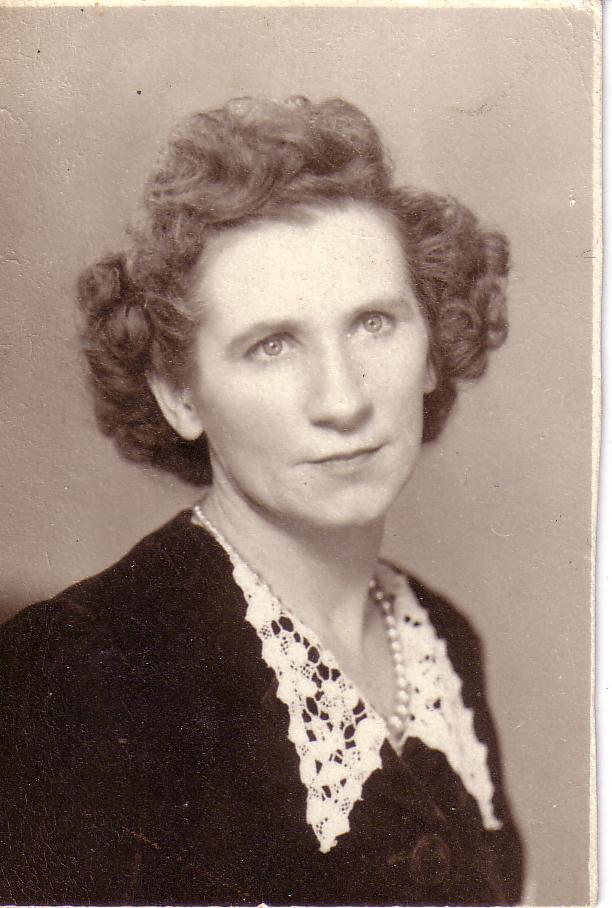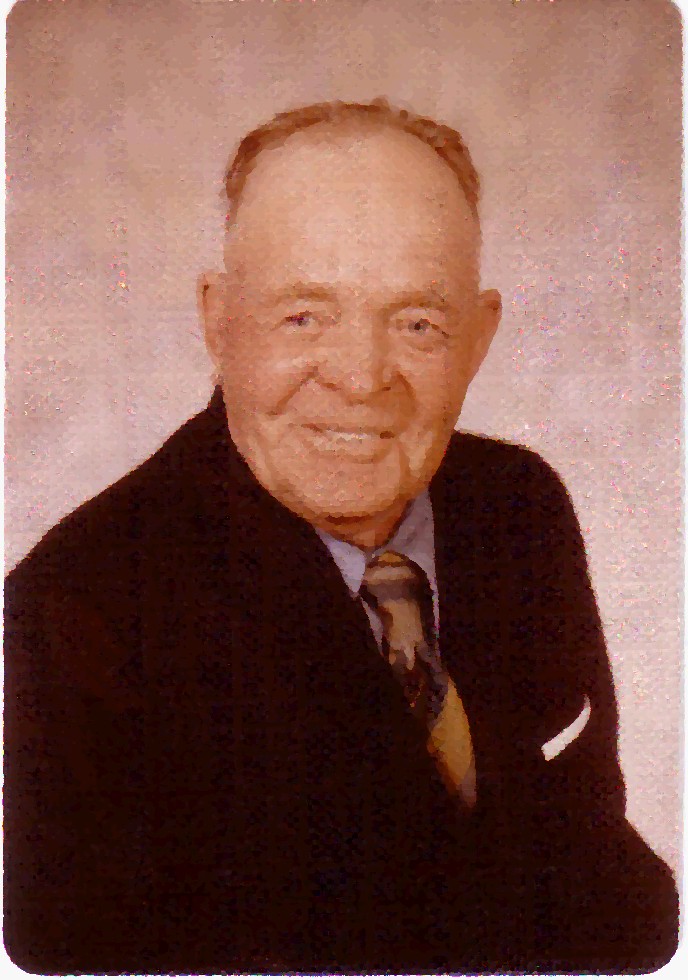David Wells Jacobson
 Leola
Dickson Jacobson
Leola
Dickson Jacobson

 Leola
Dickson Jacobson
Leola
Dickson Jacobson|
David Wells Jacobson
  Leola
Dickson Jacobson Leola
Dickson Jacobson |
| History of Charles John Stevens and Annie Serena Beck By: Marguerite S. Taylor (daughter) July 14, 1971 My father, Charles John Stevens
was born of pioneer parents, Henry Stevens and Augusta Rassimena Dorius
at Spring City, Utah, November 20, 1850. When he was two years
old, his parents moved to Washington City: Utah's Dixie. He was
taught to share with other children as grandma married into polygamy.
At a very early age, he was doing the work of a man on a farm
because of grandpa's poor health. They lived nine years there.
At eleven years of age, he had learned to pick cotton, to help
harvest cane and wheat and could drive oxen. In the spring of about 1871, they (grandma and grandpa) decided to come back to Sanpete. They drove mules on a wagon and roads were rugged. It was necessary to stop at Kano sh, Millard County, Utah. A farmer at Kano sh said if they would stay there, they could raise grain on his land on shares. They worked early and late for one season, driving on with a small amount of grain. The family arrived in Wales, Sanpete County, about 1875, where they settled on a homestead. At the age of 15, dad was a tall boy, slender but sinewy. No wonder with working so hard. He had pretty brown hair (kept it to the time of his death), blue eyes, ambitious, and well-schooled in farming. This meant more work and long hours. Regardless of hard work, he took time to find a beautiful young girl for his life-long companion, my mother, Annie Serena Beck, born October 14, 1859 to Neils Rasmussen Beck and Marie Thompson. Annie Serena Beck was the first girl born in Moroni, Sanpete County, Utah. I remember of her riding in a parade with the first boy born in Moroni. The occasion was the Black Hawk Celebration. This was several years after their marriage. Mother was a very nice looking girl; healthy, square shoulders, very good posture, plump, about 5'7'', black hair like her mother, blue eyes like her father. She was ambitious, scrubbing many floors with ashes. She said this made them so clean. Mother became an expert spinner of wool and lindsey; spinning wool for Apostle Hyde of Spring City, for years. Charley and Annie, as they were called, were married in the old Endowment House in Salt Lake City, Utah, December 12, 1878. They lived in Wales, formerly called Manassa on the West side of Ephraim, Utah, but soon made their home in Ephraim. They experienced many hardships in the early days wondering where the next meal was coming from. Their first child, Henry, was born on mothers 20th birthday, on October 14, 1879. He cried day and night, which upset a young mother to tears. There were no doctors available then. Grandpa Beck, (Mother's father) was living in Montana at this time. He insisted they come and stay with him. They sold what they had, to scrape up enough money to ride a coach. With the baby crying all the way, rough roads and the coach bobbing all the way, mother was grateful to land in Deer Lodge, Montana, safely. Grandpa was living alone. He was so happy to have his very own children near him that tears came into his eyes. He drove them all over the valley with his beautiful team of horses and buggy shouting, "This is my little Annie from Utah!" He lived in a small log cabin. He was a rich man, owning acres and acres of land and cattle. My dad fit right into this set-up, working long hours with Grandpa and enjoying every part of it. Each morning when the men went to work, mother was left alone. The neighbors were far away and so they would bolt the door because the Indians bothered them and became hostile at times. This upset mother and after one year of hard work, fear of the Indians, far away from neighbors and with a small baby, she was ready to come back to Utah. When they told Grandpa of their plans, he cried. He gave them a wagon and beautiful team of horses and as they were ready to begin their journey, Grandpa Beck made one last plea, "Charley, if you will take the harnesses off those horses and stay with me, I will set you up for life, with land, cattle and money to run this farm because you are the best worker I have ever known." Mother had great faith in her Patriarchal Blessing which said, "the Lord loves you for your integrity to the truth....". She felt Utah was the place to rear their children where they could be taught the principles of the Mormon Church. To leave Grandpa meant a great sacrifice with security within their reach (family support) as far as money was concerned. Dad loved that country and work, but he too joined mother in her thinking and came back to Utah. The journey wasn't pleasant. It took days to come over the rugged roads, along with the fear of Indians. However, they were happy with their horses and wagon. At least, they would have something to begin with. The log cabin stands in Deer Lodge, Montana, at the present time. LaVor Taylor, my husband, and I visited my cousins in the year 1956. They, along with friends that had known Grandpa, said that a better man never lived. Mother was an exceptionally good cook. Making tasty food from whatever they could scrape together. I'm sure this accounts for Dad being such a home-body. There was no place like home to him. Home was heaven to him. He had a rich singing voice, coming naturally from his mother, Augusta Dorius Stevens. No one knew this but we children. He would rock and sing to us. He was one of the worlds' best listeners. He never criticized others, never interfered in others' business. He trusted people and was interested in enterprises that would give employment to those in need of work. He invested many hundreds of dollars in their behalf; the Kolby Wheel Company, Wool Processing Co., Moroni Sugar Factory, just naming a few, all of which failed. He hauled many, many loads of coal from Castle Gate Mines, camping in the Ephraim Canyon overnight. Dad was exemplary in his eating habits; 5 AM, 12 noon, 5 PM--no in betweens, no sweets. Early to bed and early to rise was Dad's motto. He took pride in raising the best animals for eating; sausage, pork chops and steak. With Mother's soda biscuits and jam, we were well fed. I can see her and Enga Maria Olson stuffing sausage now. You could see Dad going to the County Fair each year at Manti, Sanpete County, Utah, to see the horse-pulling contest. Animals were his interests. Dad served one term as an Ephraim Councilman. In 1894, he was on a mission for the Church of Jesus Christ of Latter-Day-Saints to the Southern States. They also sent tow boys into the mission field; Alma and Simon. I remember Mother saying that all the children went to the depot so see Dad leave. As the train was pulling out, Barney, one of their children, around 7 years of age, called to Dad and said, "May I ride Balley this afternoon?" Mother impressed people with her great faith in the Lord and her desire to live His principles. She sang in the Ephraim Tabernacle Choir for years. She was known among her friends for her pleasant disposition and unusual sense of humor which Dad enjoyed so much. She worked many years in Relief Society, baking hundreds of loaves of bread for the poor. She never lost interest in government and those who were in office. She was a wonderful wife to Dad in helping to meet their obligations; milking cows, selling butter (I have her butter mold still). She slept and boarded many young men who attended Snow Academy. She could knit lace and socks beautifully. When she had disappointments and felt downcast in any way, she could be heard singing, "Tomorrow the sun will be shining although it is cloudy today." Mother and Dad depended on prayer. We were taught to kneel in prayer and ask for his guidance and protection and thank Him for the many blessings enjoyed by us. Their goals and ideals were high. At one time, they were some of the biggest tithe payers in the Ephraim North Ward. They were the proud parents of seven children; four boys - Henry, Alma, Barney, Simon and three girls - Elisabeth (Lillie), Augusta, and Marguerite (myself). Pres. Anthon H. Lund and family lived in Ephraim while they raised their children and their family and ours were good friends, having dinner together very often. The P.C. Petersons became their neighbors and close friends which was carried through the years. The children married and lived in Ephraim. Dad and Mother were so happy to have them near. Never a day but what they came to chat and talk over their work because Dad and the boys all worked together, Dad having sheep, water, and land and cattle, and everything to work with and had taught them how to work. They became prominent in this occupation. It wasn't long until each of the married boys owned their own homes and cars. On the occasion of their 50th Wedding Anniversary, they were thrilled to have all their children and grandchildren in attendance. Refreshments were served to 150 relatives and friends. Christmas Eve was one of the most fun events. We always went to my brother Henry's because he had the largest family and the biggest Christmas tree. Dad was Santa Claus; he loved to romp with the children. Great disappointments awaited them. In the Spring of 1922, all the sheep were on the desert. A terrific storm blasted the sheep. It began to snow and then to freeze. By morning, 900 ewes were frozen to death. This same year, there was a shortage of water and the crops were poor. All in all, they lost a fortune. Their greatest sorrow in their declining years was when several of their children passed away. Dad lived to see his oldest son Henry and wife (Elvira K. Stevens) die, he on March 7, 1935. Another son and wife (Alma and Ada B. Stevens), he on March 6, 1932. Then Dad died at the age of 77, on January 1, 1938. He was seriously ill about two weeks. Mother was left alone and was very lonesome. Death struck again eight months after Dad's passing. My sister Lill (Elisabeth), wife of Joseph A. Neilson, died suddenly, on August 11, 1938. Poor Mother was frantic. All of these sorrows affected her health. She died two weeks after suffering a stroke at the age of 81, on November 13, 1940. She had a very good mind and posture and was active to the end. She died at my home, now owned by Ruby Dean. Then my brother Barney died three years after Mother on February 21, 1943. His wife Mary Dye Stevens passed away in 1948. My sister Augusta, wife of Parley E Sorenson died on June 9, 1970, leaving only two of us; Simon B. Stevens (wife - Valear B. Stevens) and myself (husband - LaVor Taylor). Four died in their 50's, Simon is 77 at present time and I am 73. This history was at the Daughters of the Utah Pioneer's museum. It may not be reproduced for profit. |